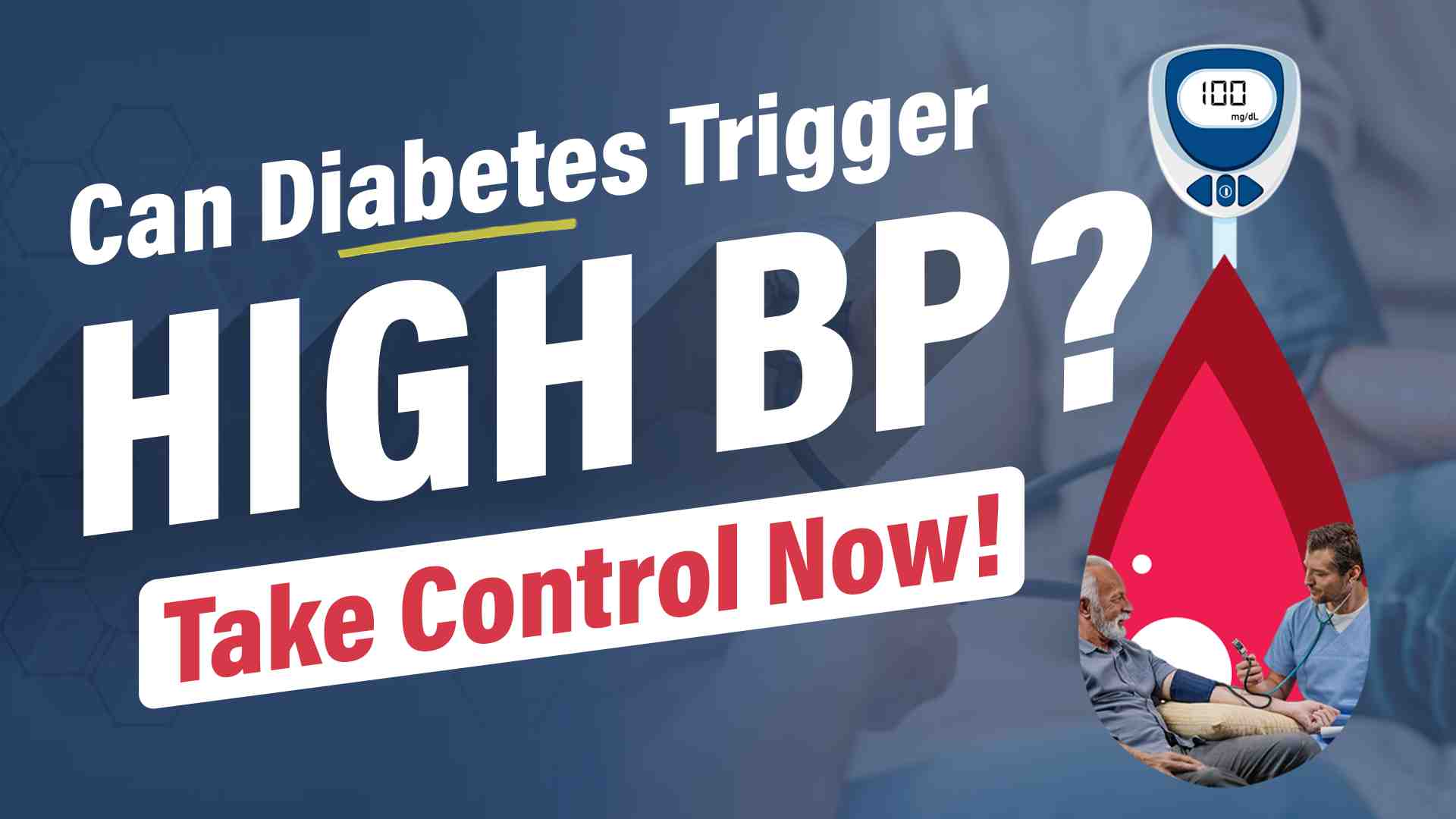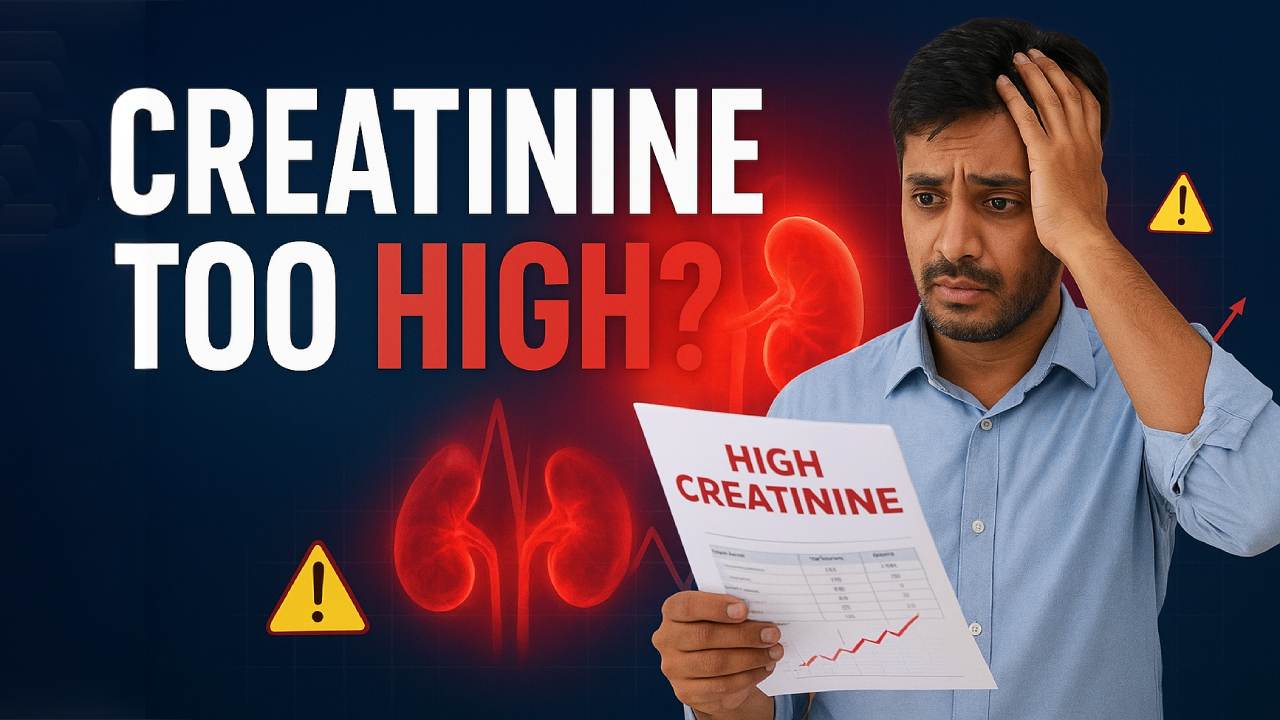How Does Diabetes Cause Hypertension?
Verified By Dr. Ashish Gupta | 08-Feb-2025
Diabetes and hypertension, two of the most common chronic conditions worldwide, often go hand in hand. Both conditions share a complex and bidirectional relationship, with one often exacerbating the other. Understanding how diabetes causes hypertension is essential for effective management and prevention. In this article, Dr. Ashish Gupta, Consultant Endocrinologist at Kailash Hospital, Noida, explains the physiological connections between these conditions, providing valuable insights for patients seeking clarity and guidance.
Table of Content
The relation between diabetes and hypertension lies in their shared risk factors, such as obesity, insulin resistance, and inflammation. Diabetes can directly contribute to high blood pressure through several mechanisms, including damage to blood vessels, fluid retention, and altered metabolic processes.
Dr. Gupta explains, “When blood sugar levels remain elevated for long periods, they damage the arteries, making them stiff and narrow. This increases the resistance to blood flow, leading to hypertension.”
1. Insulin Resistance and Blood Pressure Regulation
In type 2 diabetes, insulin resistance is a hallmark issue. Insulin not only regulates glucose but also influences vascular health. When cells become resistant to insulin:
- The balance between vasodilation (blood vessel relaxation) and vasoconstriction (blood vessel tightening) is disrupted.
- Excessive vasoconstriction leads to increased blood pressure.
Dr. Gupta emphasizes, “Insulin resistance also promotes sodium retention in the kidneys, which increases blood volume and subsequently raises blood pressure.”
2. Damage to Blood Vessels
Chronic hyperglycemia (high blood sugar) damages the inner lining of blood vessels (endothelium). This damage triggers inflammation and the formation of plaques, a process known as atherosclerosis. Narrowed arteries force the heart to work harder to pump blood, leading to hypertension.
Dr. Gupta notes, “Patients with diabetes often have stiffened arteries, which lose their ability to adjust to changing blood flow needs, contributing to persistently high blood pressure.”
3. Kidney Dysfunction
The kidneys play a critical role in maintaining blood pressure. Diabetes can lead to diabetic nephropathy, where high blood sugar damages the tiny filtering units in the kidneys. This results in:
- Fluid and sodium retention, which increase blood pressure.
- Hormonal imbalances, such as increased secretion of renin, a hormone that regulates blood pressure.
“Many of my patients with diabetes and hypertension also show early signs of kidney dysfunction,” adds Dr. Gupta. “Regular screening is essential to catch this early.”
4. Obesity and Inflammation
Obesity is one of the primary drivers of insulin resistance—a hallmark of Type 2 diabetes. Excess fat, especially visceral fat (fat around the abdominal organs), disrupts the way the body processes glucose and lipids. When insulin resistance occurs, the body struggles to regulate blood sugar levels, leading to hyperglycemia and further metabolic disturbances. Dr. Ashish Gupta, Consultant Endocrinologist at Kailash Hospital, Noida, explains "Visceral fat acts as a metabolically active organ, releasing free fatty acids and inflammatory cytokines. This cascade damages insulin signaling pathways, making the body resistant to insulin's effects."
Chronic inflammation also exacerbates oxidative stress, another contributor to hypertension. Oxidative stress damages nitric oxide—a molecule crucial for vasodilation (widening of blood vessels). As a result, blood vessels become rigid, increasing vascular resistance and blood pressure. Dr. Gupta adds "Inflammation and oxidative stress work hand in hand, creating a cycle that worsens hypertension in patients with diabetes. Managing these factors is key to breaking the cycle."
5. Autonomic Nervous System Dysregulation
Diabetes-induced autonomic nervous system (ANS) dysregulation significantly impacts cardiovascular health. The autonomic nervous system, which manages involuntary functions such as heart rate, blood vessel constriction, and blood pressure, is often impaired in people with diabetes due to chronic hyperglycemia and oxidative stress. This impairment primarily increases sympathetic nervous system activity while reducing parasympathetic input. The heightened sympathetic tone leads to persistent vasoconstriction, elevated heart rate, and increased renin release, all of which contribute to sustained high blood pressure. Additionally, damage to the ANS impairs the baroreceptor reflex, which helps regulate blood pressure fluctuations, further exacerbating hypertension in diabetic individuals.
Sleep apnea, particularly obstructive sleep apnea (OSA), plays a significant role in the interplay between diabetes and hypertension. OSA causes repeated interruptions in breathing during sleep, leading to low oxygen levels (hypoxia) and fragmented sleep. This triggers the release of stress hormones like cortisol and adrenaline, which not only disrupt blood sugar regulation but also promote vasoconstriction and increase heart rate, contributing to elevated blood pressure. Moreover, the chronic inflammation and oxidative stress caused by sleep apnea exacerbate insulin resistance and endothelial dysfunction, further intertwining these conditions.
Dr. Ashish Gupta highlights, “Sleep apnea is often underdiagnosed in patients with diabetes and hypertension, but addressing it through lifestyle changes, CPAP therapy, or weight management can significantly enhance overall health. Effective treatment not only improves oxygenation and sleep quality but also helps stabilize blood sugar levels and reduce blood pressure.”
1. Healthy Lifestyle Changes
- Diet: Adopting a diet rich in whole grains, lean proteins, fresh fruits, and vegetables while minimizing the intake of refined carbohydrates, processed foods, and sodium is essential for managing both diabetes and hypertension. Foods high in potassium, such as bananas and spinach, can also help counterbalance the effects of sodium and support healthy blood pressure.
- Exercise: Engaging in at least 30 minutes of moderate exercise most days of the week, such as brisk walking, cycling, or swimming, can significantly improve insulin sensitivity, enhance cardiovascular health, and promote blood pressure regulation. Tailored physical activity plans should be designed to suit individual fitness levels and health conditions.
- Weight Management: Maintaining a healthy weight is critical for managing both conditions. Losing even 5–10% of body weight can improve insulin resistance, reduce blood pressure, and lower the risk of complications. Sustainable weight loss achieved through a combination of healthy eating and regular exercise is most effective.
2. Regular Monitoring
Dr. Gupta recommends, “Patients with diabetes should monitor their blood pressure regularly. Early intervention can prevent complications like heart disease and kidney damage.”
At Kailash Hospital, Noida, patients with diabetes and hypertension receive comprehensive care tailored to their needs. With experts like Dr. Ashish Gupta, the focus is on not just managing symptoms but preventing complications through a proactive approach.
The intricate link between diabetes and hypertension underscores the importance of early detection, regular monitoring, and lifestyle interventions. Understanding how diabetes causes hypertension empowers patients to take control of their health. By consulting with specialists like Dr. Ashish Gupta at Kailash Hospital, Noida, patients can access personalized care that addresses the root causes of both conditions, ensuring a healthier future.
Stay informed, stay proactive, and remember that managing these conditions together is the key to preventing complications like heart disease and kidney dysfunction.



 +91-9711918451
+91-9711918451
 international.marketing@kailashhealthcare.com
international.marketing@kailashhealthcare.com







